
Tammany Hall, also known as the Society of St. Tammany, the Sons of St. Tammany, or the Columbian Order, was an American political organization founded in 1786 and incorporated on May 12, 1789, as the Tammany Society. It became the main local political machine of the Democratic Party and played a major role in controlling New York City and New York state politics. It helped immigrants, most notably the Irish, rise in American politics from the 1850s into the 1960s. Tammany usually controlled Democratic nominations and political patronage in Manhattan for over 100 years following the mayoral victory of Fernando Wood in 1854, and used its patronage resources to build a loyal, well-rewarded core of district and precinct leaders; after 1850, the vast majority were Irish Catholics due to mass immigration from Ireland during and after the Irish Famine of the late 1840s.
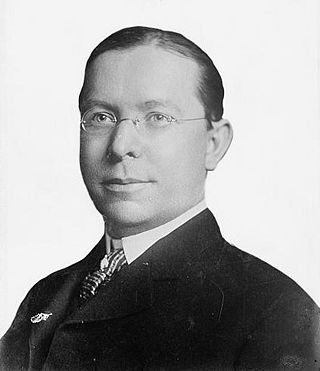
Martin Henry Glynn was an American politician. He was the 40th governor of New York from 1913 to 1914, the first Irish American Roman Catholic head of government of what was then the most populated state of the United States. A Democrat, he signed a number of important reforms, including the direct primary and labor laws.

William Sulzer, nicknamed Plain Bill, was an American lawyer and politician. He was the 39th governor of New York serving for 10 months in 1913, and a long-serving U.S. representative from the same state. Sulzer was the first, and to date only, New York governor to be impeached and the only governor to be convicted on articles of impeachment. He broke with his sponsors at Tammany Hall, and they produced convincing evidence that Sulzer had falsified his sworn statement of campaign expenditures.

Charles Francis "Silent Charlie" Murphy, also known as Boss Murphy, was an American political figure. He was also the longest-serving head of New York City's Tammany Hall, a position he served from 1902 to 1924. Murphy was responsible for transforming Tammany Hall's image from one of corruption to respectability as well as extending Tammany Hall's political influence to the national level. Murphy was responsible for the election of three mayors of New York City, three governors of New York State, and two U.S. senators, even though he was never listed as a leader of Tammany Hall.

Richard Welstead Croker, known as "Boss Croker", was an Irish American political boss who was a leader of New York City's Tammany Hall. His control over the city was cemented with the 1897 election of Robert A. Van Wyck as the first mayor of all five boroughs. During his tenure as Grand Sachem, Boss Croker garnered a reputation for corruption and ruthlessness and was frequently the subject of investigations. As his power waned following the 1900 and 1901 elections, Croker resigned his position and returned to Ireland, where he spent the rest of his life.

Abram Stevens Hewitt was an American politician, educator, ironmaking industrialist, and lawyer who was mayor of New York City for two years from 1887 to 1888. He also twice served as a U.S. Congressman from New York's 10th and chaired the Democratic National Committee from 1876 to 1877.

Thomas Francis Gilroy was the 89th mayor of New York City from 1893 to 1894.
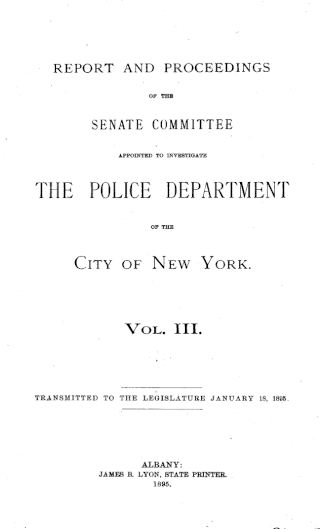
Lexow Committee was a major New York State Senate probe into police corruption in New York City. The Lexow Committee inquiry, which took its name from the committee's chairman, State Senator Clarence Lexow, was the widest-ranging of several such commissions empaneled during the 19th century. The testimony collected during its hearings ran to over 10,000 pages and the resultant scandal played a major part in the defeat of Tammany Hall in the elections of 1894 and the election of the reform administration of Mayor William L. Strong. The investigations were initiated by pressure from Charles Henry Parkhurst.

William Bourke Cockran, commonly known as Bourke Cockran or Burke Cochran in contemporary reports, was an Irish-American attorney, Democratic Party politician and orator who represented the East Side of Manhattan in the United States House of Representatives for seven non-consecutive terms between 1887 and 1923. Although associated with the liberal and progressive reform movements, he became widely known as the leading national spokesman for the Tammany Society, the powerful Democratic Party political machine in New York. As an advocate for the gold standard, he crossed party lines to endorse William McKinley in the presidential election of 1896.

James O'Brien was a U.S. Representative from New York from 1879 to 1881.

James Jay Coogan was the borough president of Manhattan, New York from 1899 to 1901, and a successful merchant and real estate manager.

John Kelly of New York City, known as "Honest John", was a boss of Tammany Hall and a U.S. Representative from New York from 1855 to 1858. The title "Honest" was given to him during his years as New York City Sheriff, and was more ironic than truthful.
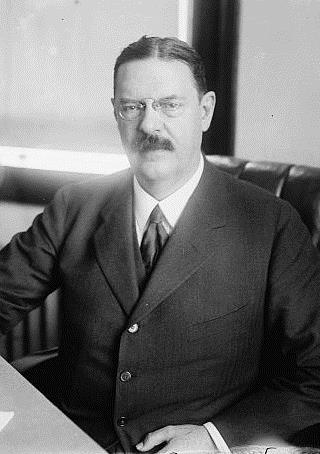
Lewis Nixon was a naval architect, shipbuilding executive, public servant, and political activist. He designed the United States' first modern battleships, and supervised the construction of its first modern submarines, all before his 40th birthday. He was briefly the leader of Tammany Hall. He started an ill-fated effort to run seven major American shipyards under common ownership as the United States Shipbuilding Company, and he was the chair of the New York City commission that began construction of the Williamsburg Bridge.
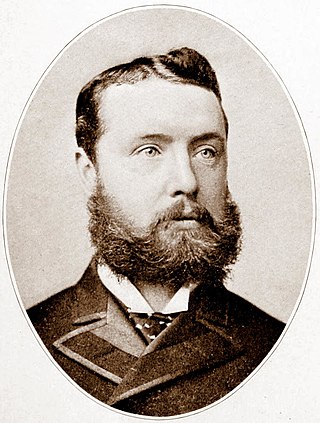
Hugh John Grant served as the 88th mayor of New York City for two terms from 1889 to 1892. First inaugurated at age 30, he remains the youngest mayor in the city's history. He was one of the youngest mayors of a major American city, and was the second Roman Catholic mayor of New York City.

John Jay Scannell was a Tammany Hall politician who was the leader of the Eleventh Assembly District. He was appointed the first New York City Fire Commissioner of the new consolidated New York City.

Samuel Langhorne Clemens , well known by his pen name Mark Twain, was an American author and humorist. Twain is noted for his novels Adventures of Huckleberry Finn (1884), which has been called the "Great American Novel," and The Adventures of Tom Sawyer (1876). He also wrote poetry, short stories, essays, and non-fiction. His big break was "The Celebrated Jumping Frog of Calaveras County" (1867).
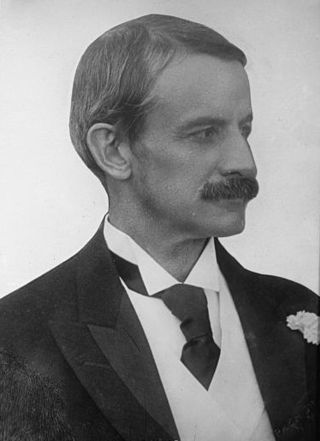
Edward Morse Shepard was an American lawyer and politician from New York.

Alfred Henry Lewis was an American investigative journalist, lawyer, novelist, editor, and short story writer, who sometimes published under the pseudonym Dan Quin.
The Committee of Seventy was a committee of 70 citizens of New York City, formed in 1871 and under the lead of Samuel J. Tilden, which conducted an investigation and prosecution of misuse of government office by William M. Tweed.

An election for Mayor of New York City was held on November 6, 1894.


















